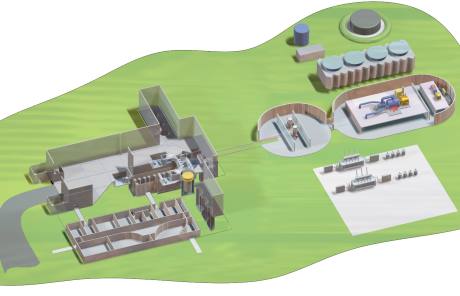Terrestrial Energy has begun a feasibility study for the siting of the first commercial Integral Molten Salt Reactor (IMSR) at Canadian Nuclear Laboratories' (CNL) Chalk River site, with a further vision of creating a technology hub at CNL to support the commercialisation of small modular reactors (SMR).
 |
| A vision of an ISMR facility (Image: Terrestrial Energy/CC-BY-SA) |
Terrestrial Energy said the study is being conducted by CNL and in parallel with a Request for Expression of Interest (RFEOI) that CNL launched on 2 June. CNL will use the responses to the RFEOI to inform a roadmap taking into account the considerations of reactor developers, the supply chain, end users and other stakeholders. The organisation aims to position itself as a key partner in the development and deployment of SMRs.
Terrestrial Energy CEO Simon Irish said the company, which aims to deploy the IMSR in the 2020s, was pleased to begin the process to identify a suitable location to build the plant.
"Supporting the research, licensing and siting of Canada's first advanced reactors is an important part of CNL's long-term plan," he said.
CNL and Terrestrial Energy last year signed a memorandum of understanding to conduct testing and validation activities in support of Terrestrial's IMSR engineering program. The non-exclusive agreement covers a range of CNL services including reactor physics, thermal hydraulics, metallurgy, chemistry, waste management and decommissioning. CNL is not restricted from building other nuclear reactor designs, and Terrestrial is not restricted from building IMSRs at other locations.
Terrestrial is also examining sites in the USA for its first commercial plant, including the Idaho National Laboratory (INL) and additional sites east of the Mississippi River. The company said in January it plans to start pre-application interactions with the US Nuclear Regulatory Commission this year and to make its licensing application in late 2019.
Molten salt reactors use fuel dissolved in a molten fluoride or chloride salt which functions as both the fuel (producing the heat) and the coolant (transporting the heat away and ultimately to the power plant). This means that such a reactor could not suffer from a loss of coolant leading to a meltdown. Terrestrial's IMSR integrates the primary reactor components, including primary heat exchangers, to a secondary clean salt circuit, in a sealed and replaceable core vessel. It is designed as a modular reactor for factory fabrication, and could be used for electricity production and industrial process heat generation.
CNL's RFEOI was launched following the release of the nuclear research and technology organisation's long-term plan, which set out a vision for the future of Chalk River Laboratories in Ontario after the National Research Universal (NRU) reactor closes down on 31 March 2018 after 60 years of operations. The NRU is one of the largest and most versatile high-flux research reactors in the world, and an important supplier of medical isotopes.
The strategy's science and technology goals include the siting of a new SMR by 2026.
Researched and written
by World Nuclear News







_94566.jpeg)






